
- •Vocabulary
- •Introduction 8 jobs, people and organizations
- •9 Organizations 2 32
- •[3 The Internet and e-commerce
- •Q] Sales and costs
- •2| Telephoning 3: messages 108
- •Introduction
- •Industry
- •Innovation and invention
- •Innovation and invention
- •McGrew is vice president of (a development/development) and product planning.
- •Electric light was (an invention/invention) which enabled people to stay up later.
- •Indian Rice Research Centre. I’m in charge of research (5)
- •I love (14 technological) , using scientific knowledge (15) improve
- •If he goes on undercutting us, we
- •It’s a terrible place to work. We have to make 30 calls an hour, with few breaks.
- •Invalid entry.
- •6 Volkswagen’s sales rose to 1,058,000 cars from 996,000 a year earlier.
- •The materials used in the boats, and the boatbuilders’ salaries (overhead cost / cogs)
- •Which product has the highest level of profitability as a percentage of its selling price?
- •Years of on investment in Britain’s railways have left them in a very bad state.
- •Planning the concert, they found they had forgotten to the singers,
- •A loan that a company has to repay to a bank over five years is a long-term liability.
- •Don’t want to have the situation where I’ve spent more than I’ve put in.
- •On the savings account, what’s the percentage you pay to savers every year?
- •Peter is 26 and is wondering whether to join his company pension scheme.
- •30 Years ago
- •20 Years ago
- •Petrol prices set to skyrocket
- •Sterling plummets as us dollar weakens
- •Paradiso president axes finance minister /
- •Here the male managers talk about the market as if it was some kind of battlefield.
- •7590 W Charleston Blvd
- •Senior Partner e-mail: kesposito@ace.Com
- •Voicemail
- •That’s strange. Their switchboard isn’t big enough to handle all the calls they get.
- •That’s ridiculous! a company with 500 employees, but no one answers the phone.
- •Switchboard operator: Sorry to keep you waiting. ... I’m putting you through.
- •A: It’s been good talking to you. I’m going to have to go. I’ve got to go to a meeting.
- •It was good to hear from you again. The following pages give details of the latest additions to our range. If you require any further information, please do not hesitate to contact me.
- •I’m pleased to announce another good year for shareholders of this company.
- •I know this sounds crazy, but how about giving away 100,000 free samples?
- •I recommend to shareholders that you accept Megabook’s offer for our company.
- •Off: to show how important and clever they are. The chair should keep things
- •I’ve been asked to chair a meeting about the Christmas office party, but I’m incredibly nervous as I’ve never chaired one before. Is there a secret for success?
- •The combined resources of our two organizations will allow us to achieve great things.
- •It could sound monotonous and boring if you speak from a complete, prepared text.
- •They add visual interest, provide you with support and help the audience follow you.
- •Reforms 4 pressures 6 economy
Don’t want to have the situation where I’ve spent more than I’ve put in.
How much is in my savings account? What’s the amount in there at the moment?
On the savings account, what’s the percentage you pay to savers every year?
How much extra money have vou added to my savings account in the last three months?
On the last list of the all the money going out of and coming into the account, there’s an amount that you’ve taken off the account that I don’t understand.
Match the sentence beginnings (1-3) with the correct endings (a-c). The sentences
all contain expressions from C opposite.
Investment companies are reporting a sharp increase in the number of
Consumers are using their windfall gains from building society
Peter is 26 and is wondering whether to join his company pension scheme.
He would contribute a small percentage of his salary and his employer would make an equivalent contribution.
a If he decides to stay for at least two years he should join. If not, he should take out a personal pension.
b small investors who are investing in unit trusts.
c demutualizations to buy new furniture or a new car.
+o ipu
What type of bank accounts and personal investments do you prefer? What are the advantages and disadvantages of the different types?
Financial centres
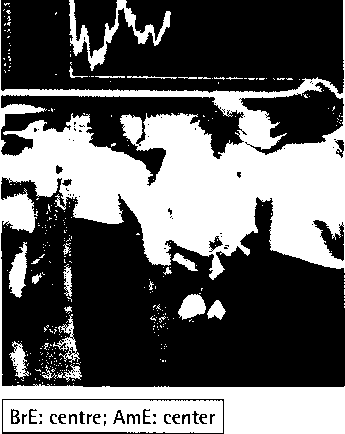 Financial
centres
Financial
centres
Financial centres are places where there are many banks and other financial institutions. London as a financial centre is called the City or the Square Mile, and New York is Wall Street.
Financial centres bring together investors and the businesses that need their investment. A speculator is an investor who wants to make a quick profit, rather than invest over a longer period of time.
Brokers, dealers and traders buy and sell for investors and in some cases, for themselves or the organizations they work for.
Stock markets
Heather Macdonald of Advanced Components:
‘We needed more capital to expand, so we decided to float the company (sell shares for the first time) in a flotation. Our shares were issued, and listed (BrE and AmE) or quoted (BrE only) for the first time on the stock market. Because we are a UK-based company, we are listed on the London stock exchange.
Stock markets in other countries are also called bourses. Maybe when our company is really big, we’ll issue more shares on one of the European bourses!’
BrE:
shares / stocks (countable) and shares AmE: stock (uncountable)
one or two words.
Other financial markets
Other financial products include:
commercial paper: short-term lending to businesses.
bonds: longer-term lending to businesses and the government.
currencies (foreign exchange or forex): buying and selling the money of particular countries.
commodities: metals and farm products.
These are traded directly between dealers by phone and computer. Commodities are also traded in a commodities exchange. Shares, bonds and commercial paper are securities, and the financial institutions that deal in them are securities houses.
Derivatives
A futures contract is an agreement giving an obligation to sell a fixed amount of a security or commodity at a particular price on a particular future date.
An options contract is an agreement giving the right, but not the obligation, to buy or sell a security or commodity at a particular price at a particular future time, or in a period of future time.
These contracts are derivatives. Dealers guess how the price of the underlying security or commodity will change in the future, and use derivatives to try to buy them more cheaply.
Correct the eight mistakes in italics in this article, using expressions from A opposite.
Now that a lot of buying and selling can be done over computer networks, (1) breakers and (2) tradesmen do not need to be in one place, and (3) speculists can make money dealing from a computer in their living room.
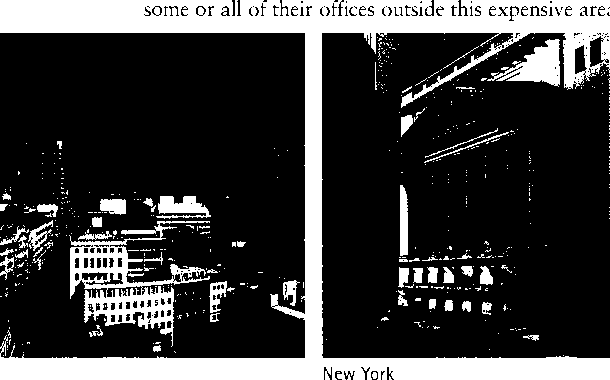 In
New York, the area around (4) the
South Bronx
is traditionally home to many financial institutions, such as the New
York Stock Exchange. But many of them have now moved
In
New York, the area around (4) the
South Bronx
is traditionally home to many financial institutions, such as the New
York Stock Exchange. But many of them have now moved
London is one of Europe’s most important financial (5) towns: over 500 foreign banks have offices in London, and its stock exchange is the largest in Europe. But more and more financial (6) institutes are not actually based in the traditional area of the (7) Citadel or (8) Mile Square. As in New York, they are moving to areas where property is cheaper.
So, will financial centres continue to be as important in the future as they are now?
Look at B opposite and say if these statements are true or false.
‘Stocks’ is another name for shares.
‘Stock market’ means the same as ‘stock exchange’.
Bourses are only found in France.
An American would normally talk about shares ‘quoted’ on the New York Stock Exchange.
Shares in Company X are being sold for the first time. This is a flotation.
Use expressions from C and D opposite to describe:
a bank that makes companies’ shares available.
a contract to buy 500 tons of wheat for delivery in three months.
coffee and copper.
dollars, euros and yen.
lending to a company for less than a year.
lending to a local government authority in the form of 10-year investment certificates.
shares and bonds, but not currencies or commodities.
the London Metals Exchange.
the right to buy shares in a company in one month, at 150 pence per share.
Over +o upu
What is your country's main financial centre? Is it in the capital or another city?
What are the advantages and disadvantages of different securities and commodities, and ways of dealing?
jtfi
Trading
If there is demand for shares in a company, for example because it is doing well, its share price goes up. If not, its price goes down. The overall value of shares traded on a stock market is shown by an index (plural: indexes or indices). Some of the main ones are:
Paris:
CAC 40.
Frankfurt:
DAX.
Hong
Kong: Hang Seng.
Tokyo:
Nikkei.
London: FTSE
(pronounced ‘Footsie’): the Financial Times Stock Exchange index.
New York: the Dow Jones Industrial Average (‘the Dow’) Especially long-established ‘old economy’ companies. New York: NASDAQ. Especially hi-tech ‘new economy’ companies.
Jan
Feb Mar April May June July Aug Sept Oct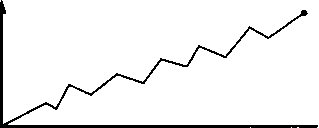
Market activity: good times ...
Trading has been heavy on the New York Stock Exchange, with very high turnover of one and a half billion shares changing hands. We’ve seen spectacular gains, especially among blue chips.
This bull market seems set to continue, after yesterday’s record high at the close. Dealers seem bullish and expect the Dow to go through the
barrier soon.
‘Translation’
= buying and selling of shares ...
= large number ...
= being bought and sold ...
= big increases in value ... famous companies wi history of profit in good and bad economic time
= rising prices ...
= highest level ever ...
= end of the working day ...
= optimistic ...
= to pass the ‘round’ number of...
and bad times
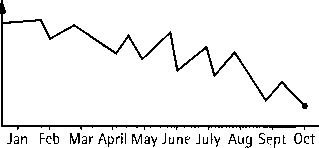
There was panic selling on the New York Stock Exchange today as prices fell to new five-year lows. We’ve seen some spectacular declines, with billions of dollars wiped off the value of some of America’s best-known companies, and more than
per cent of total market capitalization.
The bear market continues, with prices set to fall
further in the next few days. Dealers are bearish, with many saying there is no sign of a rally. If prices continue to fall, there may be another stock market collapse or crash, like the ones in 1929 and 1987.
‘Translation’
= selling shares for any price ...
= their lowest point for five years ...
= large decreases ...
= taken off the total share value ...
= the total value of shares listed on the market going down by 10 per cent ...
= falling prices ...
= pessimistic ...
= prices starting to rise again ...
= very serious drop in the value of shares on the market, with serious economic consequences ...
Note:
The following words have a similar meaning.
Verb
to
rally to recover
Noun
a
rally a recovery
37.2
37.3
Use
expressions from B opposite to describe:
shares
in companies like IBM, Kodak, and Procter and Gamble.
buying
and selling of shares on a stock market.
a
day with twice as many shares sold as usual on a particular stock
market.
shares
that were worth $15 and are now worth $110.
a
period when the stock market index has gone from 20,000 to 25,000.
the
feelings of dealers who are optimistic that prices will continue to
rise.
when
a stock market index reaches 25,500 for the first time.
the
level on a stock market index which may be difficult for shares to
pass.
Complete
these headlines with expressions from C opposite.
Yesterday
in Asia, in (1) , the Hang Seng closed 1.6
per
cent up at 15,657 exactly. In Tokyo the (2) was
also
up, at 15,747.20. In (3) last night, the (4)
closed
1.8 per cent higher at 10,824 exactly, and the
hi-tech
(5) index was 3.3 per cent up at 3,778.32.
Turning
now to Europe, in early
trading
in (6) the FTSE
is
0.1 per cent down at 6,292.80.
The
French (7) index is
also
slightly down at 6,536.85. The
(8) in
Germany, however,
is
0.1 per cent higher at 6,862.85.

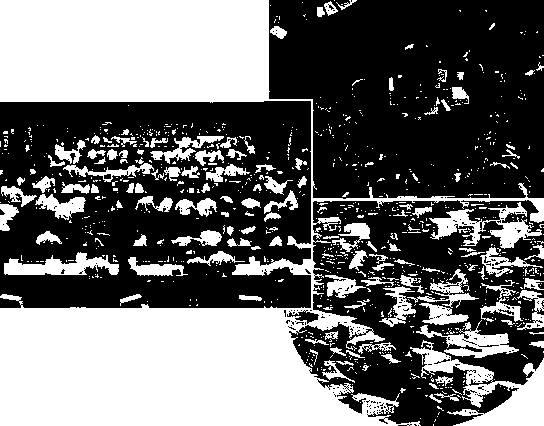
TECHNOLOGY STOCKS SEE BIG
AS INVESTORS RUSH TO SELL AT ANY PRICE
SHARES CONTINUETO SLIDE: MARKET MAY END IN
SHARE PRICES AT TWO- YEAR
DEALERS AS MARKET
SENTIMENT CONTINUES TO WORSEN
PRICES CONTINUE TO FALL
WITH NO SIGN OF
ON THE HORIZON
BILLIONS OFF SHARES IN NERVOUS TRADING
![]()
Over +o tpu
Is it usual in your country for ordinary people to own shares? Do people follow the stock market closely?
Indicators 1
Finance and economics
Finance is:
money provided or lent for a particular purpose.
the management of money by countries, organizations or people.
the study of money management.
High finance involves large amounts of money used by governments and large companies. A person’s or organization’s finances are the money they have and how it is managed, etc. The related adjective is financial.
Economics is:
the study of how money works and is used.
calculations of whether a particular activity will be profitable.
Related adjectives: a profitable activity is economic; an unprofitable one is uneconomic. If something is economical, it is cheap to buy, to use or to do. If not, it is uneconomical.
Economic indicators (see B, C and D below) are figures showing how well a country’s economy (economic system) is working.
Inflation and unemployment
Inflation is rising prices, and the rate at which they are rising is the inflation rate. The related adjective is inflationary.
The unemployed are people without jobs in a particular area, country, etc. The level of unemployment is the number of people without a job. Unemployed people are out of work, and are also referred to as jobless (adj.) or the jobless.
Trade
The balance of payments is the difference between the money coming into a country and that going out. The trade balance is the difference between payments for imports (goods and services from abroad) and payments for exports (products and services sold abroad). When a country exports more than it imports, it has a trade surplus. When the opposite is the case, it has a trade deficit. The amount of this surplus or deficit is the trade gap.
Growth and GDP
Economic output is the value of goods and services produced in a country or area. Gross domestic product or GDP is the value of all the goods and services produced in a particular country.
The size of an economy is also sometimes measured in terms of gross national product or GNP. This also includes payments from abroad, for example, from investments.
Growth is when output in the economy increases. The growth rate is the speed at which a company’s economy grows and gets bigger.
